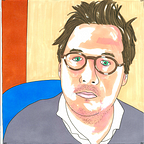Purpose In The Time of Quarantine
“…Learn to sit still like a mountain in a hurricane…” — Pema Chordron
I’ve long held that the good business person and the good Buddhist both look at the world unencumbered by past biases. In this way, business people avoid innovator’s dilemma-type pitfalls as well as keep from falling prey to Dunning-Kruger (mis)assumptions.
This principle has served me well in business. My mantra is: “I don’t know, but I can create a testable informed thesis and then — a la my hero Edward Deming — test and refine.”
All that I possess and use
Is like the fleeting vision of a dream.
It fades into the realms of memory;
And fading, will be seen no more.
But, consistent with the lines above from the great Buddhist poet, Shantideva, the moment you fool yourself into thinking that there is some predictability, you are reminded of another of my favorite phrases, “The Buddha laughs at plans.”
What we’re facing now with COVID-19 is unprecedented for anyone alive today. It is, or should be, forcing us to re-evaluate everything….personal and professional.
In the midst of this, of course, we have certain duties and obligations. The second of the three Buddhist Commitments is the Bodhisattva Vow. To paraphrase Chordron: This is the commitment to keep our hearts and minds open and to nurturing our compassion with the longing to ease the suffering of the world.
Beyond the personal obligations I’m attempting to honor during this time, I have obligations as a business person. The challenge I’ve confronted with respect to many of the companies I have the privilege to work with is how to balance the duty of trying to keep the business afloat with the duty of being a compassionate human.
The two, of course, are not typically binary. In fact, the entire GHS ethos revolves around the thesis that a “Purpose Not Product” approach obviates many of the tensions that otherwise emerge in a capitalist construct.
But when faced with this unprecedented challenge, terms like “conscious capitalism” or “social entrepreneurship” seem to tilt too far towards the “capitalism” or “entrepreneurship” side of the ledger, when we really need more emphasis on the “conscious” or “social” elements.
Any business person with even the hint of a soul or conscious is facing this commerce versus compassion dynamic now more than ever. Where I’ve fallen (and, of course, it is and I am a work in progress) is that businesses have a heightened duty.
The concept of a fiduciary duty is both an ethical and a legal one. My favorite interpretation of fiduciary duty is “duty of care.” In this way, it corresponds nicely with the Buddhist tenet of the Bodhisattva Vow. As business leaders, now more than ever, we have a duty — to our customers, to our employees, to our stakeholders — to provide care.
This care can and should come in the form of finding ways to create value, whether monetary, impact, or otherwise, and to do this now requires leaders to be the mountain of purpose amidst the hurricane of confusion.
Entrepreneurship & Art: All Artists are Entrepreneurs and the best Entrepreneurs are Artists
Read more here: https://www.entrepreneurshipandart.com/
